In late July, the Wall Street Journal reported that “63% of voters hold an unfavorable view of the Democratic Party—the highest share in polls dating to 1990 and 30 percentage points higher than the 33% who hold a favorable view.” While the article focused primarily on Democrats’ precipitous reputational decline, of greater interest—the bigger story within the story, it seemed to me—is the sustained unpopularity of both major American political parties in recent decades. Democrats have not enjoyed a net favorability rating in any year since 2015. Republicans have not enjoyed one since 2004.
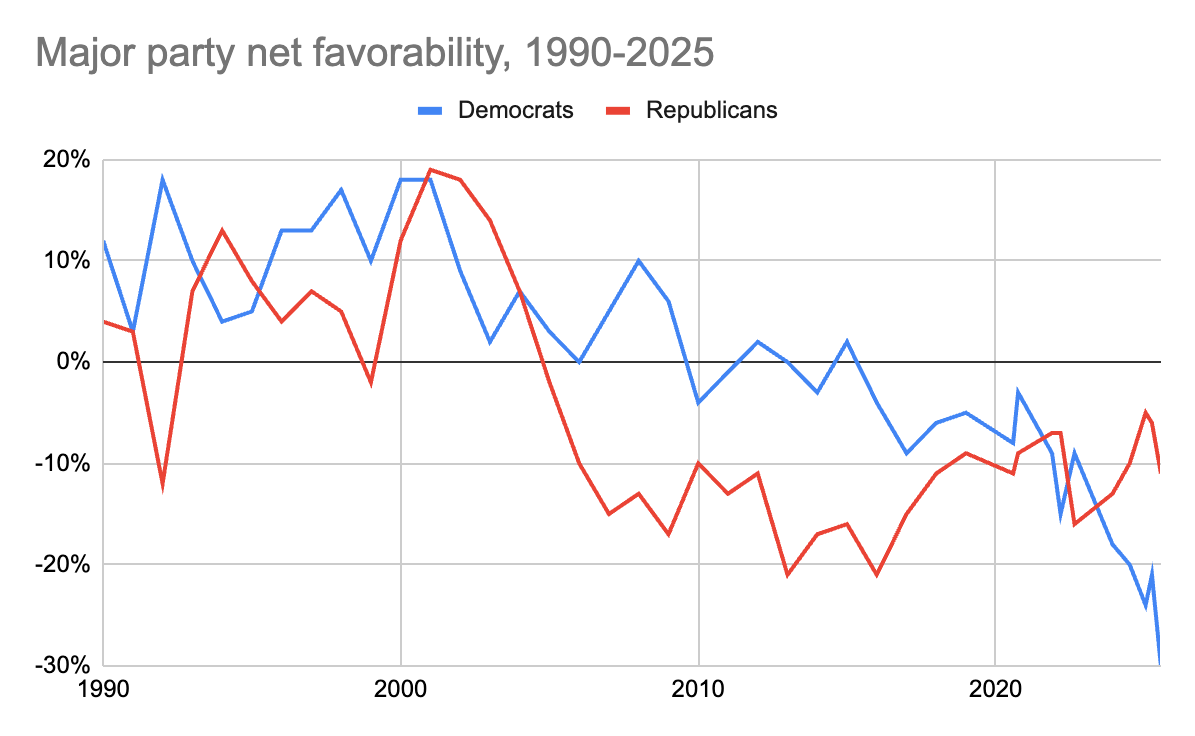
Lately I have found myself curious as to whether these downward trends are connected to widely publicized partisan legislative redistricting across the country—more popularly known as “gerrymandering”—and curious, too, as to the modern history of this phenomenon. I decided to build a dataset of state legislative and federal congressional delegation membership by political party for all 50 states. Through this effort I discovered that, from 1977 to 1992, the total number of states with at least two-thirds legislative supermajorities diminished steadily—a trend driven principally by the disintegration of the New Deal-Jim Crow coalition that secured power to the Democratic Party after the Great Depression and waned with “big government” fatigue in the 1970s and shifting Southern political allegiances following the Civil Rights Movement. (It is almost impossible to overstate the importance of segregationist politics to Democratic Party national dominance in the mid-20th century. In the 11 formerly Confederate states, Democrats averaged 97% control of state legislatures and congressional delegations in 1953. In Louisiana, Mississippi, South Carolina, and Texas, not a single state or federal legislator was a Republican that year.)
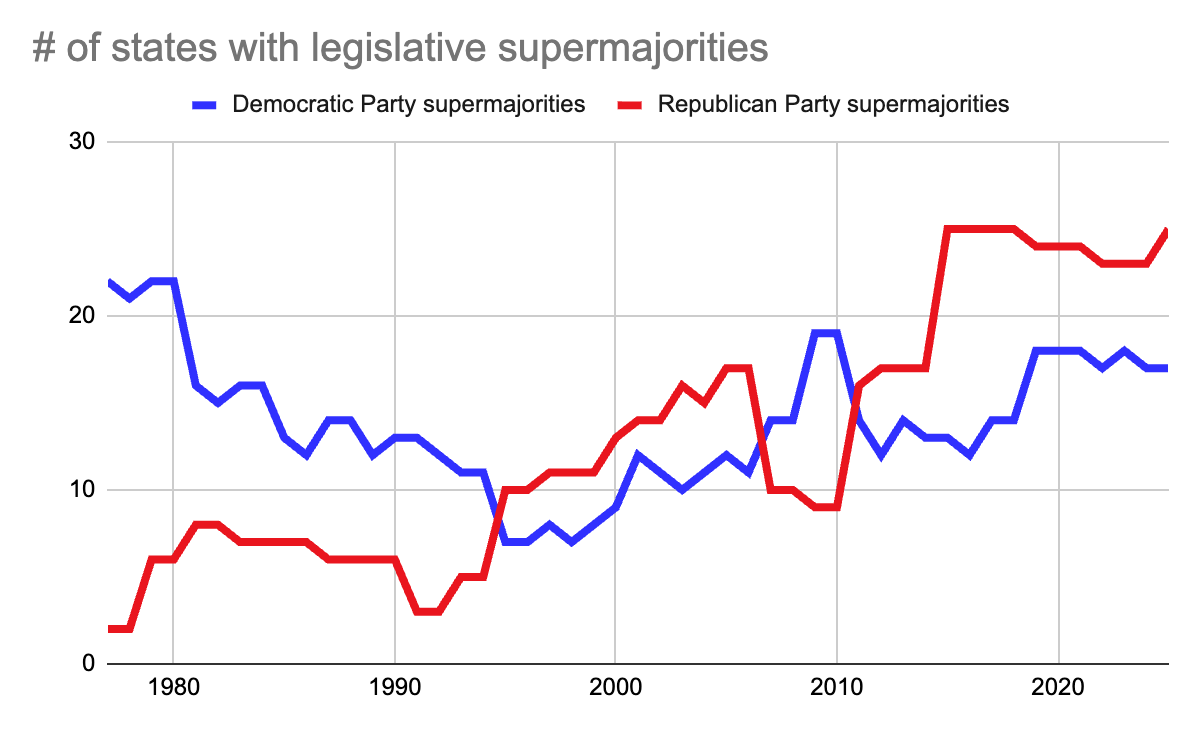
After 1992, the story began to change as both major parties—Republicans especially—accrued legislative dominance in states where they could. As a result, whereas 81% of Americans in 1998 resided in states without supermajority legislative control in the hands of either party, in 2025 only 19% of us do. The resemblance of this trend to that reported in the Wall Street Journal is striking. (Aaron Zitner, in a subsequent Journal article, noted that in 40 states today, the same party that controls the legislature also controls the governor’s office. “That leaves less than 20% of Americans living in a state where the minority party has a meaningful voice in governance.”)
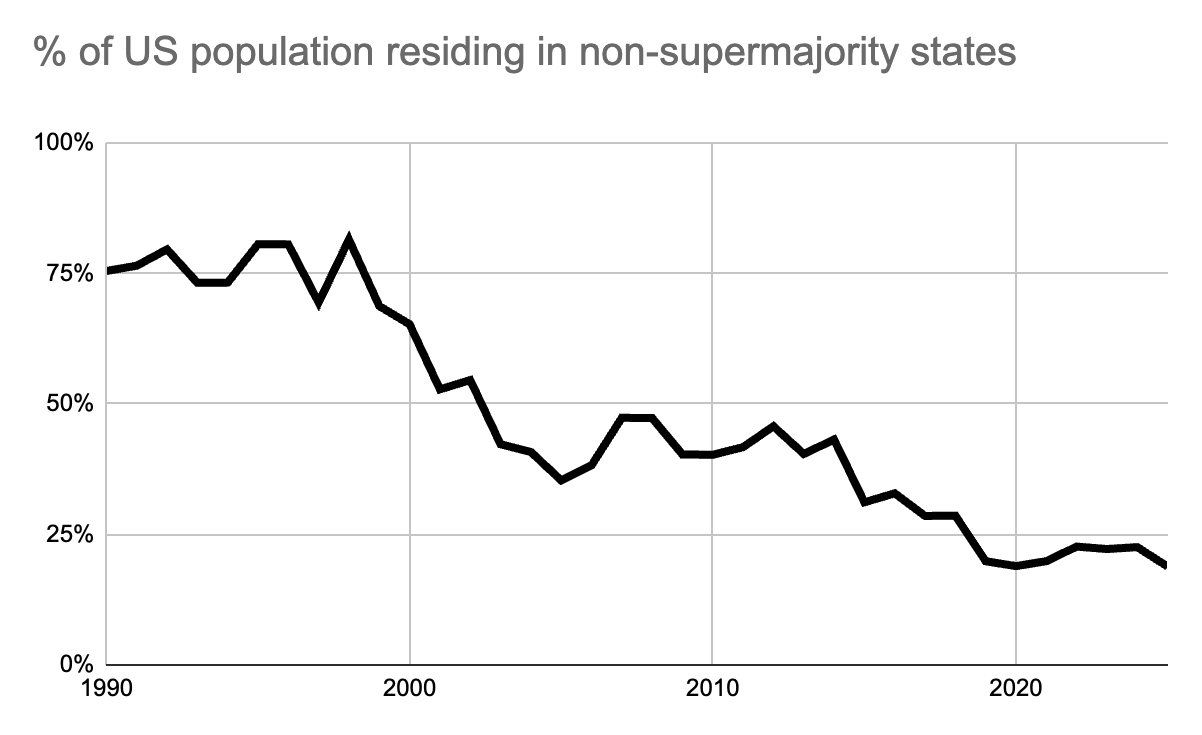
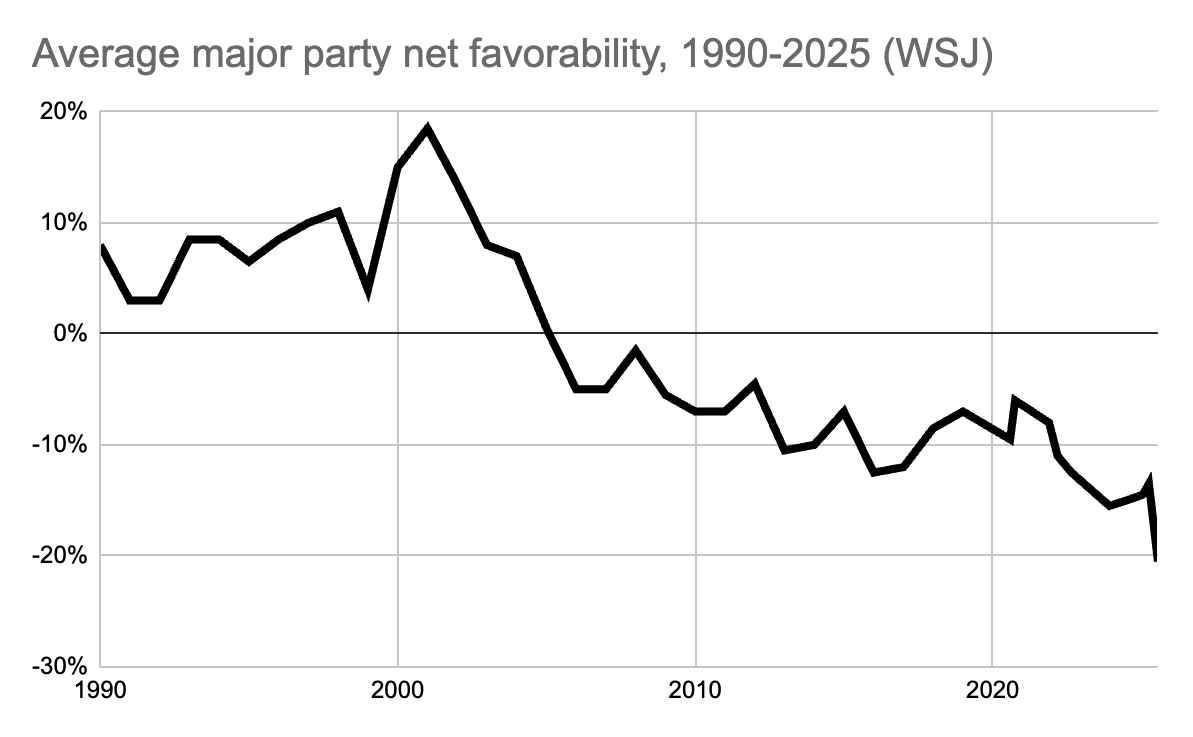
The “effective disenfranchisement” phenomenon of the last several decades is perhaps even more obvious when presented geographically. In the maps below, I have represented two-thirds legislative supermajorities in dark blue and red, three-fifths supermajorities in light blue and red, and simple majorities—all states, in other words, in which minority party representation and bipartisan compromise are more likely—in a neutral color. Only four states in our nation today are governed by simple legislative majorities: Arizona, Georgia, Pennsylvania, and Wisconsin. Not coincidentally, in last year’s presidential election all four were characterized as “swing states,” a term that essentially did not exist in 1992.
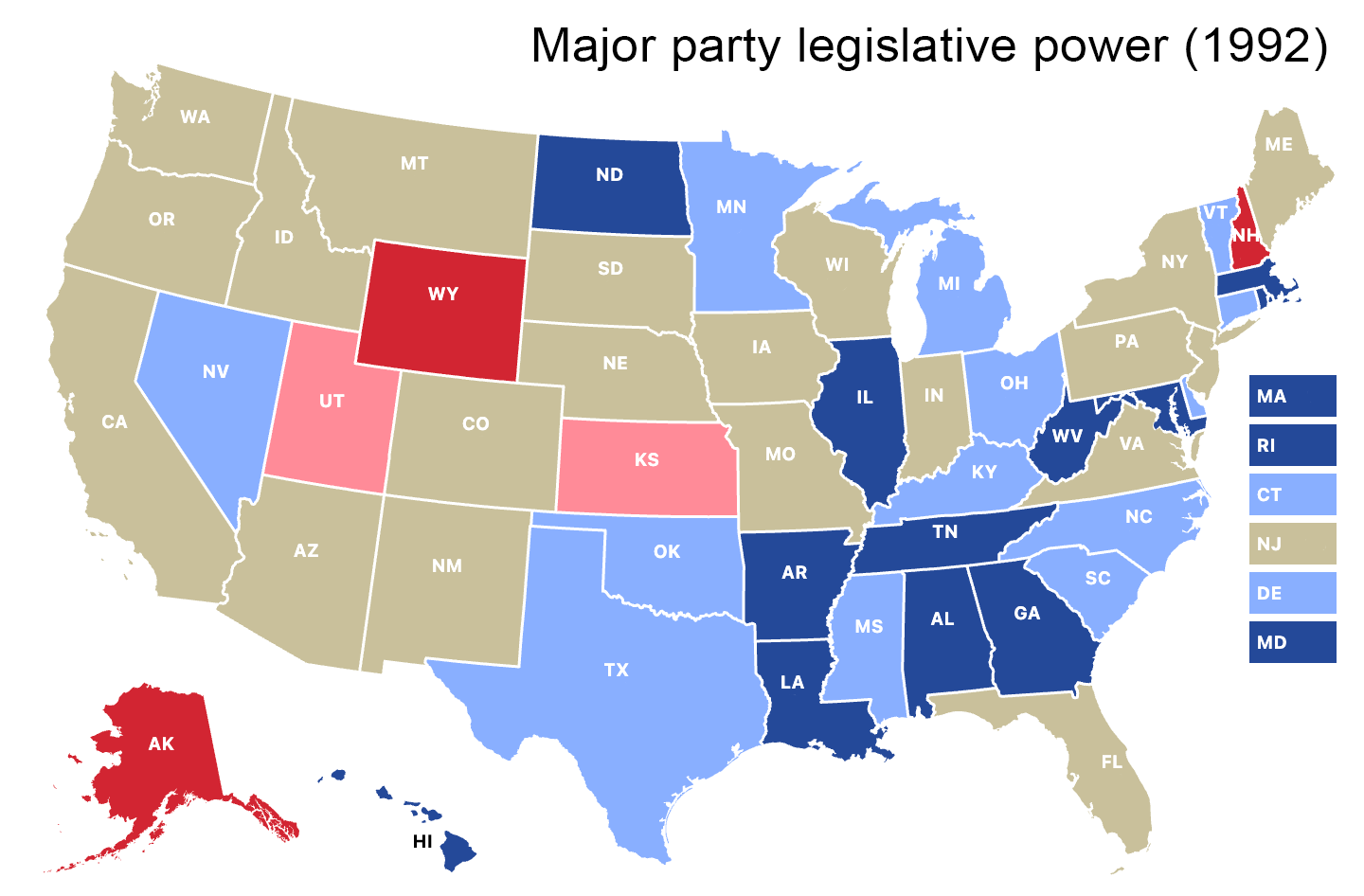
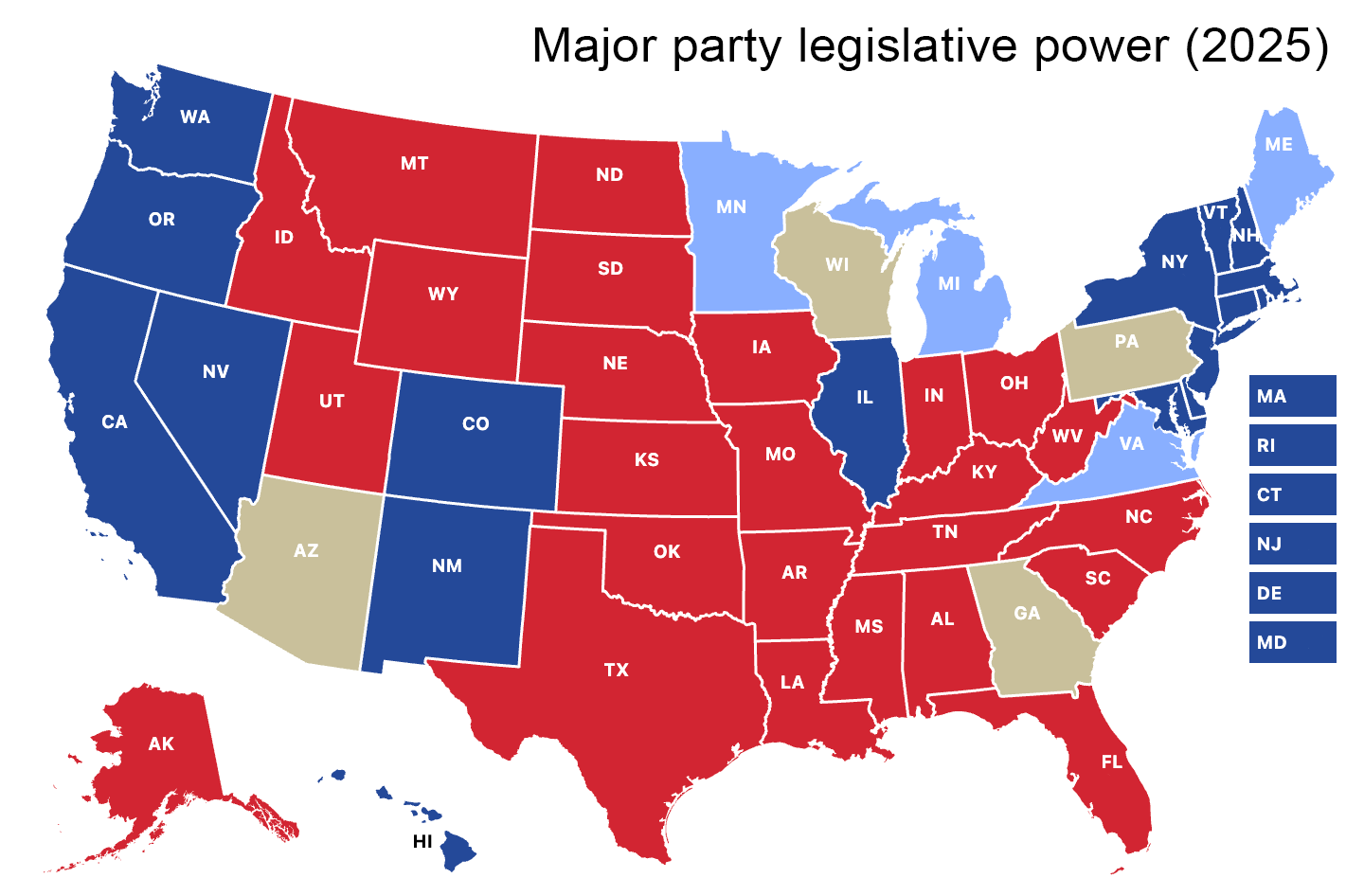
In choosing effective voter disenfranchisement as my subject this week, I have multiple intentions. I seek to model, as our extraordinary MICDS teachers model every day, the imperative of our Mission Statement to “think critically”—in this case to question the presentation of information in a major media outlet, to gather and analyze relevant data, and to identify further questions. Is the coincidence of disaffection with the two major American political parties, and the effective disenfranchisement of voters through tactics like gerrymandering, a matter of correlation or causation? If the latter, which phenomenon is the cause, and which is the effect? In other words, have we allowed legislative supermajorities to occur in our democracy because we increasingly dislike one or the other political party, or do we increasingly dislike one or the other political party because legislative supermajorities effectively silence so many of our voices? (Bear in mind how many millions of people voted for Donald Trump in the dark blue states mapped above, and how many millions of people voted for Kamala Harris in the dark red ones.) In such a manner do questions beget more questions every day at MICDS, across all grade levels and curricula, and I am inspired by the example of our faculty in encouraging and nurturing habits of curiosity and hard work in our students so that they can understand—or at least endeavor to understand—the complexities of their world.
In choosing my subject today, I also seek simply to acknowledge the contentious political climate in contemporary America which, in ways both direct and indirect, inevitably affects the children and adolescents in our care. Objectivity and empathy in the experience of this climate, as opposed to emotionalism and judgment, are constructive habits of mind. These, too, evoke the commitments of our Mission—to “meet the challenges of this world with confidence” and to “embrace all its people with compassion.”
Finally, I choose my subject today in the same spirit of hope that elevates our work at MICDS universally. It was not so long ago that most Americans were similarly governed by legislative supermajorities, secured in no small measure through overtly racist means. Our nation found a path through that period, secured in no small measure through acts of remarkable civic courage. A new period of voter disenfranchisement is now emerging in ways both comparable to and divergent from those of that prior era. Defeatism is no answer. “Responsible men and women” (my final nod to our Mission Statement) are not defeatists. “Come on children, you’re acting like children,” laments Belleville native and Wilco founder Jeff Tweedy in the song You Never Know. “Pull yourselves together. Every generation thinks it’s the end of the world.”
Shortly after the Constitutional Convention of 1787, Alexander Hamilton published Federalist No. 9 to support the establishment of the United States as a federal republic. “The petty republics of Greece and Italy,” he acknowledged, “were kept in a state of perpetual vibration between the extremes of tyranny and anarchy,” but only because they lacked, among other safeguards, sufficient “representation of the people in the legislature by deputies of their own election.” This democratic and republican representational ideal (lower-case “d,” lower-case “r”) is under threat today—by ostensible Democrats and Republicans no less—but it has been under threat before. Now as then, hard work, humanity, and hope—critical thinking, compassion, and confidence—will be indispensable to keeping it. We foster these virtues at MICDS and look forward to what the future holds. After all, you never know.
Always reason, always compassion, always courage. Happy Labor Day weekend!
Jay Rainey
Head of School
This week’s addition to the “Refrains for Rams” playlist is You Never Know by Wilco (Apple Music / Spotify).

